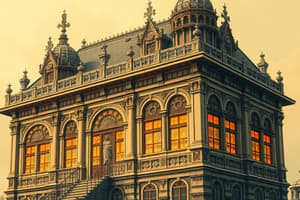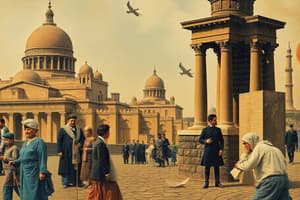Podcast
Questions and Answers
What is Mesopotamia known for developing?
What is Mesopotamia known for developing?
- Maritime navigation
- Writing and law codes (correct)
- Democratic governance
- Plumbing systems
Which river was central to the development of ancient Egypt?
Which river was central to the development of ancient Egypt?
- Tigris River
- Nile River (correct)
- Indus River
- Amazon River
What type of belief system did ancient Egyptians follow?
What type of belief system did ancient Egyptians follow?
- Agnosticism
- Monotheism
- Polytheism (correct)
- Atheism
Which of the following inventions is associated with ancient China?
Which of the following inventions is associated with ancient China?
What was a key feature of the feudal system during the Middle Ages?
What was a key feature of the feudal system during the Middle Ages?
Who are some key figures associated with the Renaissance?
Who are some key figures associated with the Renaissance?
What was the main cause of World War I?
What was the main cause of World War I?
Which of the following describes a characteristic of the Age of Enlightenment?
Which of the following describes a characteristic of the Age of Enlightenment?
Flashcards are hidden until you start studying
Study Notes
Ancient Civilizations
-
Mesopotamia:
- Located between Tigris and Euphrates rivers.
- Known as the "Cradle of Civilization."
- Developed writing (cuneiform) and law codes (Hammurabi's Code).
-
Egypt:
- Centered around the Nile River.
- Known for pyramids, hieroglyphics, and a polytheistic belief system.
- Inventions include the calendar and medical practices.
-
Indus Valley:
- Located in present-day Pakistan and northwest India.
- Advanced urban planning and drainage systems (e.g., Mohenjo-Daro).
- Writing system remains undeciphered.
-
China:
- Yellow River was key to early civilization.
- Developments include paper, gunpowder, and compass.
- Major dynasties: Xia, Shang, and Zhou.
Classical Antiquity
-
Greece:
- Birthplace of democracy, philosophy (Socrates, Plato, Aristotle), and the Olympic Games.
- Key city-states: Athens (culture) and Sparta (military).
- Alexander the Great expanded Greek influence.
-
Rome:
- Started as a republic; transitioned to an empire.
- Known for engineering (roads, aqueducts) and law (Roman law).
- Key figures: Julius Caesar, Augustus, and Nero.
Middle Ages
-
Feudal System:
- Social hierarchy: kings, nobles, knights, peasants.
- Land ownership tied to service and loyalty.
-
The Church:
- Dominant influence in Europe; Catholic Church led by the Pope.
- Major role in education and preservation of knowledge.
-
Crusades:
- Religious wars between Christians and Muslims over holy lands.
- Resulted in cultural exchanges but also significant loss of life.
Renaissance
-
Cultural Rebirth:
- Revitalization of art, science, and literature based on classical sources.
- Key figures: Leonardo da Vinci, Michelangelo, and Galileo.
-
Humanism:
- Focus on human potential and achievements.
- Shift from religious to secular topics in art and literature.
Modern History
-
Age of Enlightenment:
- Intellectual movement advocating reason, individualism, and skepticism of tradition.
- Key philosophers: John Locke, Voltaire, and Rousseau.
-
Industrial Revolution:
- Transition from agrarian to industrial economies.
- Changes in manufacturing, transportation, and labor conditions.
-
World Wars:
- WWI (1914-1918): Triggered by assassination of Archduke Franz Ferdinand; resulted in large military and civilian casualties.
- WWII (1939-1945): Global conflict involving major powers; characterized by genocide (Holocaust) and the use of nuclear weapons.
Contemporary History
-
Cold War (1947-1991):
- Ideological conflict between the United States (capitalism) and the Soviet Union (communism).
- Key events: Korean War, Cuban Missile Crisis, and the space race.
-
Globalization:
- Increased interconnectedness in trade, culture, and technology.
- Positive effects: economic growth; negative effects: cultural homogenization and inequality.
Key Concepts
- Historiography: Study of historical writing and methods.
- Primary vs. Secondary Sources:
- Primary: Original documents (letters, treaties).
- Secondary: Interpretations or analyses (textbooks, articles).
- Periodization: Classifying history into periods for study (e.g., Ancient, Medieval, Modern).
Mesopotamia
- Located between the Tigris and Euphrates Rivers
- Known as the "Cradle of Civilization"
- Developed cuneiform writing, a system of wedge-shaped characters.
- Developed Hammurabi's Code, one of the earliest known written legal codes.
Egypt
- Centered around the Nile River
- Known for its pyramids, hieroglyphic writing, and complex polytheistic belief system
- Invented the calendar and developed advanced medical practices
Indus Valley
- Located in present-day Pakistan and northwest India
- Had advanced urban planning and drainage systems, as evidenced by the city of Mohenjo-Daro
- Writing system remains undeciphered.
China
- Early civilizations centered around the Yellow River
- Developed key inventions like paper, gunpowder, and the compass
- Major dynasties included the Xia, Shang, and Zhou dynasties
- Highly influential on the development of East Asian culture.
Greece
- Birthplace of democracy
- Flourished in philosophy with key figures like Socrates, Plato, and Aristotle
- Home to the Olympic Games
- Important city-states included Athens (known for its culture and philosophy) and Sparta (known for its military strength)
- Expansion under Alexander the Great spread Greek influence across a vast empire.
Rome
- Began as a republic and transitioned to an empire
- Known for its engineering feats, including roads, aqueducts, and bridges
- Developed Roman law, a system of law that influenced legal systems worldwide
- Key figures include Julius Caesar, Augustus, and Nero.
Feudal System
- Social hierarchy with kings at the top, followed by nobles, knights, and peasants.
- Land ownership was tied to service and loyalty.
- A decentralized system where power was distributed amongst different lords.
The Church
- Catholic Church held immense influence in Europe, with the Pope as its supreme leader.
- Played a vital role in education, preserving knowledge and spreading Christianity.
- Influenced nearly every aspect of life in medieval Europe, from politics to personal morality.
Crusades
- Religious wars between Christians and Muslims over the control of holy lands.
- Resulted in cultural exchanges, but also significant loss of life.
- Motivated by religious fervor and political ambitions.
Renaissance
- Marked by a cultural rebirth in Europe based on classical sources
- A period of artistic, scientific, and intellectual flourishing
- Key figures: Leonardo da Vinci, Michelangelo, and Galileo
- Characterized by a shift away from religious dogma and towards humanism
Humanism
- A philosophical and cultural movement that emphasized human potential and achievements.
- Focused on secular themes in art and literature
- Influential in shifting focus from religious to worldly concerns.
Age of Enlightenment
- An intellectual movement emphasizing reason, individualism, and skepticism of tradition.
- Key philosophers: John Locke, Voltaire, and Rousseau
- Influential in shaping modern political thought and revolutions.
Industrial Revolution
- Transformation from agrarian economies to industrial economies
- Significant advancements in manufacturing, transportation, and technologies
- Led to growth in population and urbanization, but also issues such as pollution and inequality
World War I
- Triggered by the assassination of Archduke Franz Ferdinand in 1914
- Resulted in major military casualties and civilian deaths
- Marked by the use of new technologies like machine guns and chemical weapons
- Led to the collapse of empires and the birth of new nations.
World War II
- A global conflict that began in 1939
- Involved major world powers
- Marked by genocide, particularly the Holocaust
- Resulted in the development and use of nuclear weapons.
Cold War
- An ideological conflict between the United States (representing capitalism) and the Soviet Union (representing communism).
- Characterized by proxy wars, arms races, and intense propaganda
- Key events: Korean War, Cuban Missile Crisis, and the space race
- Ultimately ended with the collapse of the Soviet Union in 1991.
Globalization
- Increased interconnectedness in trade, culture, and technology
- Positive effects: economic growth, cultural exchange, and technological advancements.
- Negative effects: widening inequality, cultural homogenization, and environmental degradation.
Historiography
- The study of historical writing and methods
- Examines how history is written, interpreted, and presented
- Focuses on historical sources, narratives, and biases.
Primary vs Secondary Sources
- Primary sources are original documents such as letters, diaries, treaties, or photographs.
- Secondary sources are interpretations or analyses of primary sources, such as textbooks, articles, or biographies.
Periodization
- A method of classifying history into distinct periods for study.
- Allows historians to organize and analyze historical events in a meaningful way.
- Examples of periods include Ancient, Medieval, and Modern periods.
Studying That Suits You
Use AI to generate personalized quizzes and flashcards to suit your learning preferences.




